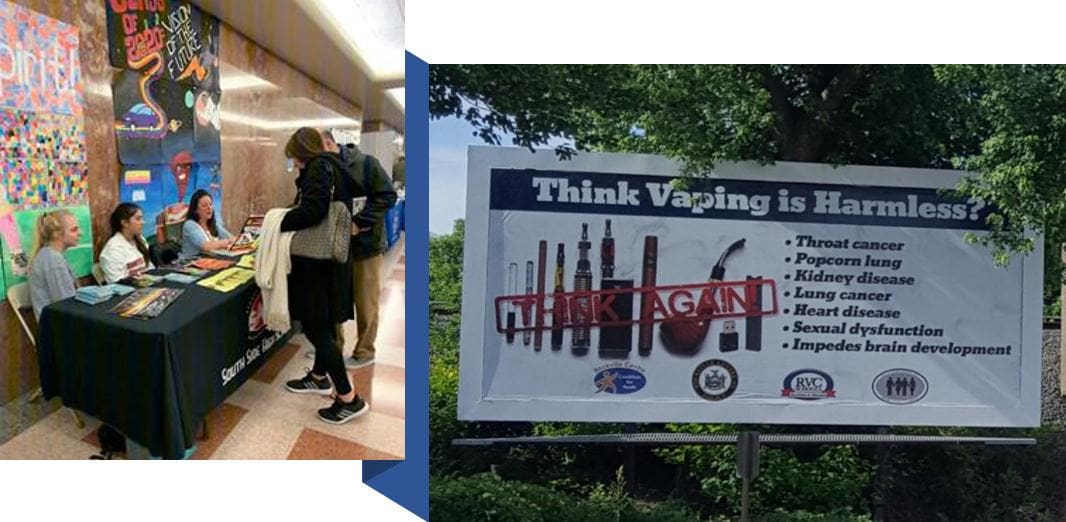
“Rockville Centre (RVC) is a 3.25 square mile community in southwestern Nassau County, New York,” said Coalition Coordinator Ruthanne McCormack. “Incorporated as a village in 1893, the primary residential community includes a village police force, two public libraries, a college, a hospital, eight schools and fourteen parks. The socioeconomic indicators show a higher than average income and education median from the rest of the state, valuable housing stock and small rates of adult unemployment, but the village is also home to low income housing including a housing authority and section eight housing. The village has a number of support services for low income and immigrant population, including an Economic Opportunity Commission, Hispanic Brotherhood, the Martin Luther King Center, Parish Outreach at St. Agnes Parish and the Vineyard Church Food Pantry.
“Because the school district and private regional schools are exceptional, our students are college directed, but this also poses its own set of risks for young people coming of age in the village,” said McCormack. “Expectations on young people are high, with tremendous pressure on our young people to achieve. Drugs and alcohol are easy to come by. The Long Island Railroad’s Babylon line runs through town, and the first urban stop is Brooklyn, which is a high crime inner city neighborhood, and police and local drug counselors describe this as an easy pathway for illicit drugs into suburban communities like Rockville Centre.
“Past 30-day alcohol use by teens is significantly higher than the national average, with teens reporting easy access to alcohol at home, at parties, and where teens congregate outdoors,” said McCormack. “Police and parents regularly report serious issues with teen drinking, and the police report nearly 200 hospital runs a month for alcohol and drug use. Combating these dangers must be a priority.
“In August of 2014 many Rockville Centre community groups, after working together for years to address the problems with teen substance misuse, formally became a coalition, and together filed a grant application to bring federal funding from the Drug-Free Communities grant program into the Village of Rockville Centre,” said McCormack. “Members of the RVC Youth Council, Inc., wrote the grant and in September of 2015 the RVC Youth Council, Inc., as legal representative for the Rockville Centre Coalition for Youth, was awarded a Drug-Free Communities grant worth $125,000 every year for five years, contingent on quarterly outcome measurement reports being written and approved.”
“Youth suicide is on the rise in Rockville Centre. During the 2019 school year two youth committed suicide at our Long Island Railroad Station – one in January 2019 and another in March 2019,” said McCormack. “We have partnered with coalition sector members to better educate our parents and youth on the dangers of substance use to treat depression and the signs to look for when a person may be at risk for suicide.
“We offer programs for the entire community explaining the dangers of substance misuse by using educational speakers, awareness walks, billboards, PSAs, vinyl banners, sticker shock, prevention campaigns and more,” said McCormack. “Our Billboards are seen by thousands of youth every day and our prevention messages really help to educate them on the dangers of substance use.
“In 2017 we partnered with CVS and the New York National Guard to receive a permanent medication drop box at our local police station,” said McCormack. “As a result of our efforts, 30-day youth alcohol use is down in grades 8th to 11th. We are in the process of presenting our latest survey results to the school board later this month.
“Our youth coalition spearheads our prevention campaigns,” said McCormack. “The youth see firsthand what is going on in our community and where our prevention efforts should be focused. Mental illness and substance use is a top priority.
“Four of our coalition’s members will be attending CADCA’s National Leadership Forum this year,” said McCormack. “We expect to bring back ideas to strengthen our advocacy efforts regarding the legalization of commercial marijuana as well as information from other coalitions regarding best practices and community involvement. As recipients of the CADCA’s Non-Opioid Choices Grant we are looking forward to educating our community on the dangers of opioid use.”


